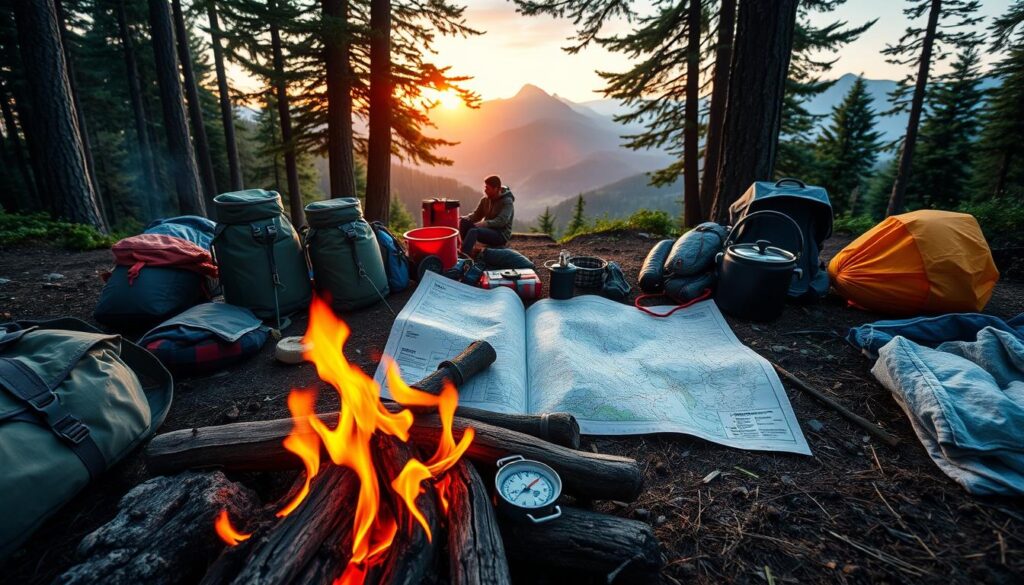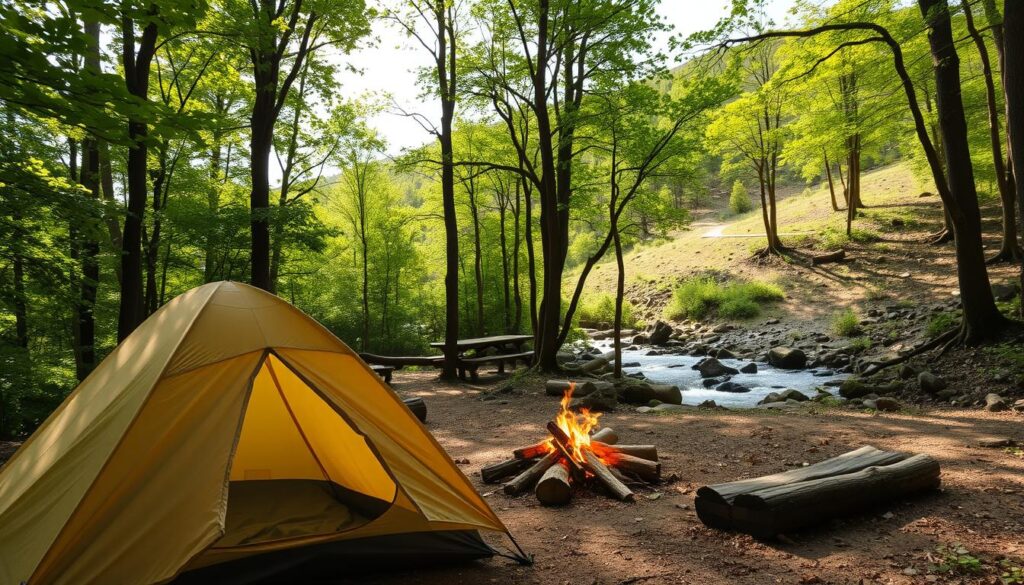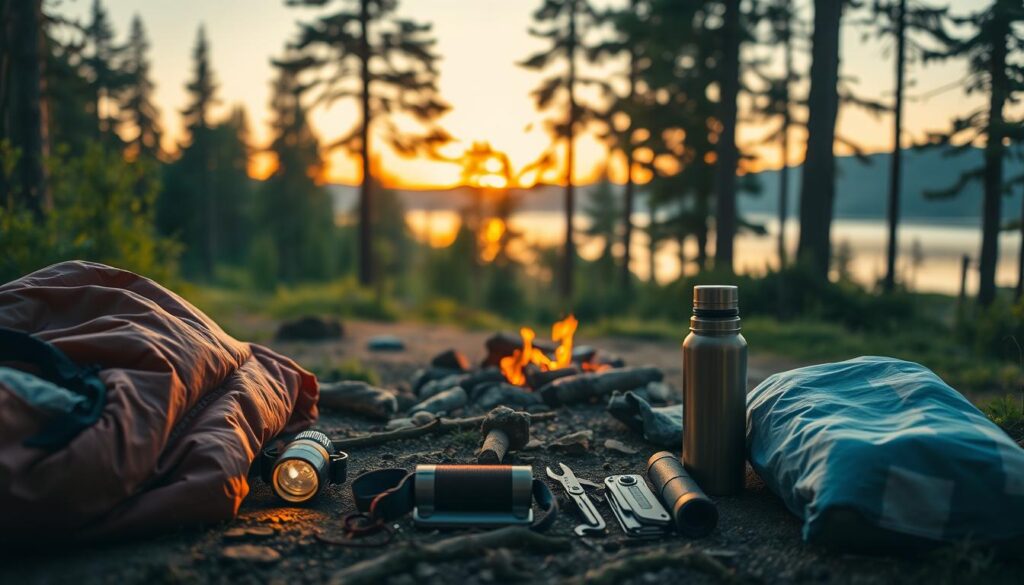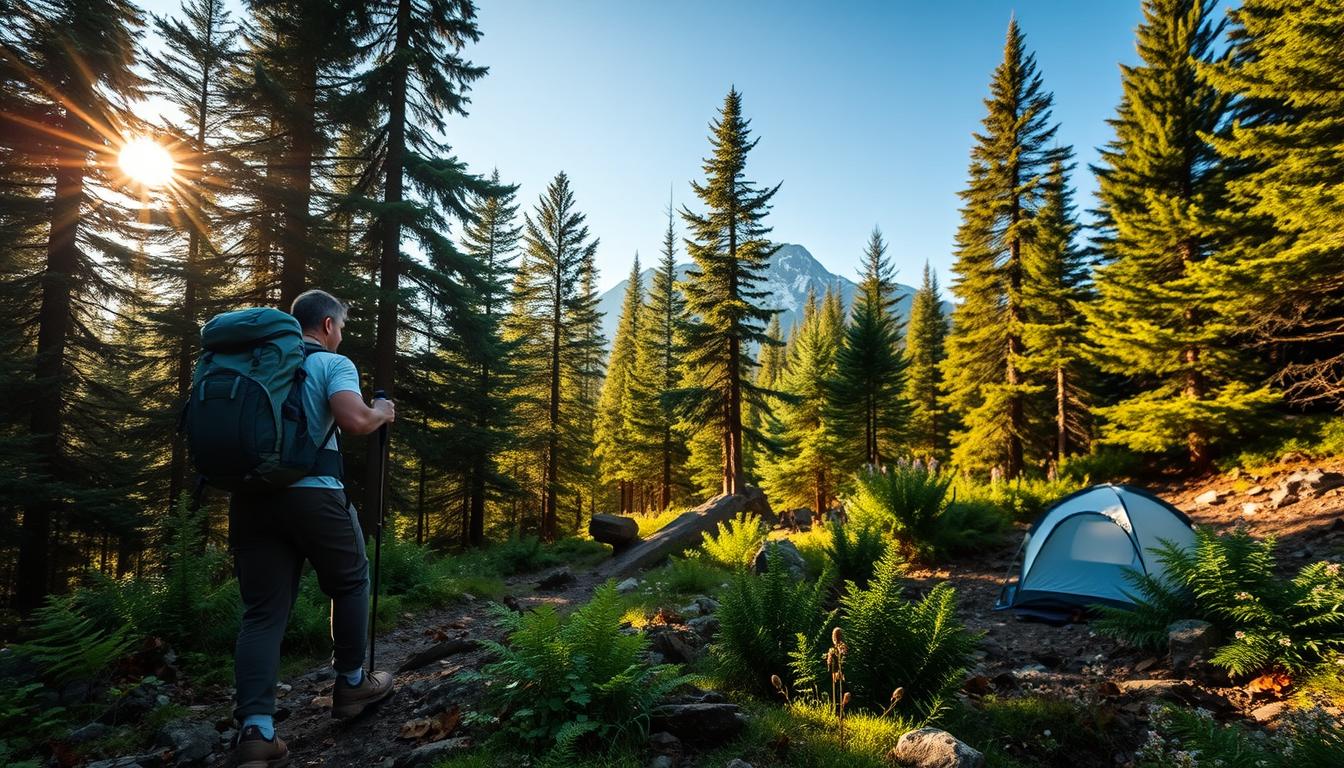Embarking on a camping trip can be a thrilling experience, offering a chance to disconnect from the hustle and bustle of daily life and reconnect with nature. It’s an opportunity to engage in various camping activities and enjoy the great outdoors.
Planning the perfect trip involves understanding what to expect and preparing accordingly. Whether you’re a seasoned camper or just starting out, the joy of outdoor adventure awaits. Camping remains a beloved activity for many, providing a unique chance to bond with family and friends or simply enjoy some solitude in nature.
Key Takeaways
- Understand the basics of camping and what to expect.
- Learn how to plan a successful camping trip.
- Discover the joys of outdoor adventure.
- Explore various camping activities for all ages.
- Prepare for a memorable experience in nature.
The Magic of Outdoor Adventures
Embarking on an outdoor adventure can be a life-changing experience, offering a unique blend of excitement and tranquility. As we immerse ourselves in nature, we open ourselves up to a world of benefits that can enhance our overall well-being.
Physical and Mental Health Benefits of Nature Immersion
Spending time outdoors has been shown to have a positive impact on both physical and mental health. Nature immersion can reduce stress levels, improve mood, and even lower blood pressure. The fresh air and peaceful surroundings of a campsite can work wonders for our mental well-being.
Creating Meaningful Connections Away from Screens
Camping trips provide an opportunity to disconnect from the digital world and reconnect with family and friends. Without the distraction of screens, we can engage in meaningful conversations, share stories, and create lasting memories. This quality time together strengthens bonds and fosters a sense of community.
Why Camping Remains a Beloved American Tradition
Camping has long been a cherished tradition in America, offering a chance to escape the hustle and bustle of daily life and connect with the great outdoors. Whether it’s a family vacation or a solo adventure, camping allows us to tap into our sense of adventure and appreciation for nature.
Let’s Go Camping: Planning Your Adventure
To make the most of your camping trip, it’s essential to plan carefully, considering factors like season and destination. A well-planned adventure ensures a safe and enjoyable experience for everyone involved.
Selecting the Ideal Season for Your Camping Goals
The season you choose for your camping trip significantly impacts your experience. For instance, summer offers warm weather ideal for swimming and fishing, while autumn provides a picturesque backdrop with foliage. Consider your camping goals and the activities you have planned when deciding on the best time to go.
Researching Destinations: Parks, Forests, and Campgrounds
Research is key to finding the perfect camping spot. Look into national parks, forests, and private campgrounds, considering factors like accessibility, amenities, and the type of environment you prefer. Websites and camping apps can provide valuable insights and reviews from fellow campers.

Understanding Reservation Systems and Permit Requirements
Many popular camping destinations require reservations or permits. Understanding these systems in advance is crucial to avoid last-minute disappointments. Familiarize yourself with the reservation policies and ensure you have all necessary permits before heading out.
As John Muir once said, “In every walk with nature, one receives far more than he seeks.” Planning your camping trip thoughtfully will help you connect with nature and create lasting memories.
Choosing Your Campsite Strategy
The key to a successful camping trip lies in choosing the perfect campsite that suits your needs. With various camping styles and site options available, making an informed decision is crucial.
Comparing Camping Styles: Car, Tent, RV, and Backcountry
Camping styles vary widely, from the convenience of car camping to the rugged adventure of backcountry camping. Tent camping offers a more traditional experience, while RV camping provides comfort and amenities. Understanding these differences helps in selecting the best option for your family.
Site Selection Criteria: Water, Shade, and Terrain
When choosing a campsite, several factors come into play. Access to water is essential for drinking, cooking, and hygiene. Shade provides relief from the sun, and suitable terrain ensures a level and comfortable sleeping area. Consider these factors when evaluating potential sites.
| Campsite Feature | Importance | Considerations |
|---|---|---|
| Water Access | High | Proximity to water source, water quality |
| Shade | Medium | Tree cover, shade duration |
| Terrain | High | Level ground, drainage |
Family-Friendly vs. Remote Sites: Making the Right Choice
Deciding between family-friendly and remote campsites depends on your camping goals. Family-friendly sites offer amenities and social opportunities, while remote sites provide solitude and a more primitive experience. Consider your family’s needs and preferences when making this decision.

Essential Camping Gear Checklist
When planning a camping trip, it’s essential to assemble a comprehensive checklist of camping essentials to ensure a smooth and enjoyable journey. Having the right gear can make all the difference between a memorable adventure and a challenging experience.
Shelter Systems: Finding the Right Tent for Your Needs
Selecting the appropriate tent is crucial for a comfortable camping experience. Consider factors such as the number of occupants, weather conditions, and the terrain when choosing a tent. Look for features like waterproof material, sturdy poles, and adequate ventilation. For instance, a family of four might require a tent with a capacity for six to ensure comfort and extra space for gear.
| Tent Type | Capacity | Weather Resistance |
|---|---|---|
| Backpacking Tent | 2-3 people | High |
| Family Tent | 4-6 people | Medium to High |
Sleep Comfortably: Bags, Pads, and Pillows
A good night’s sleep is vital for enjoying the camping experience. Invest in a high-quality sleeping bag rated for the expected low temperatures, and consider a sleeping pad for comfort and insulation. Don’t forget a camping pillow for added comfort.
- Sleeping Bag: Choose a bag with the right temperature rating and comfort features like a hood.
- Sleeping Pad: Provides insulation and comfort. Inflatable pads offer more comfort but may require a pump.
- Camping Pillow: Compact and designed for outdoor use.
Lighting, Tools, and Tech: Practical Necessities
Apart from shelter and sleeping gear, other essentials include reliable lighting, multi-tools, and technology to stay connected and safe. LED lanterns and headlamps are excellent for lighting, while a multi-tool or pocket knife can assist with various tasks.
“The right tools can make a significant difference in your camping experience, from setting up camp to dealing with unexpected situations.”

By carefully selecting and packing these essential items, campers can ensure a well-prepared and enjoyable trip. Remember, the key to a great camping experience lies in the details and preparation.
Packing Strategies for Outdoor Success
To ensure a comfortable and enjoyable camping trip, packing the right gear is essential. A well-planned packing strategy is crucial for a successful outdoor adventure.
Clothing Layers for Unpredictable Weather
Unpredictable weather can make or break a camping trip. Packing clothing layers is vital to adapt to changing conditions. Include a base layer for colder mornings and evenings, a mid-layer for insulation, and a waterproof outer layer.
- Moisture-wicking base layers
- Insulating mid-layers
- Waterproof outer layers
Personal Items and Hygiene Essentials
Personal hygiene is often overlooked when camping, but it’s crucial for camping safety and comfort. Pack essentials like toothbrushes, biodegradable soap, and any personal hygiene items you need.
- Toiletries
- Biodegradable soap
- First aid kit
Organizing Your Gear for Easy Access
A well-organized campsite is a happy campsite. Use storage bins and bags to keep your gear organized and within reach. This will save you time and reduce stress during your trip.
- Storage bins
- Gear bags
- Accessories organizers
By following these camping tips, you’ll be well-prepared for your next outdoor adventure.
Camping Safety: Preparation and Protocols
A safe and enjoyable camping trip hinges on preparation and knowledge of safety protocols. Camping, while a fun outdoor activity, comes with its risks, including encounters with wildlife, unpredictable weather, and potential injuries.
Wildlife Awareness and Food Storage
One of the critical aspects of camping safety is being aware of the local wildlife and storing food properly. Keep a clean campsite, and store food and trash in airtight containers to avoid attracting animals. In areas with bears, use bear-resistant containers or hang food at least 10 feet off the ground and 4 feet out from the trunk.
Weather Monitoring and Emergency Planning
Weather conditions can change rapidly in the wilderness. Campers should monitor forecasts and be prepared for emergencies. Have a plan for severe weather, including knowing the nearest shelter or evacuation route. Always carry a first aid kit and know how to use the items in it.
First Aid Essentials and Wilderness Safety
Accidents can happen, even with the best planning. Knowing basic first aid is crucial. Campers should be familiar with treating wounds, recognizing signs of heatstroke or hypothermia, and knowing what to do in case of an emergency. A well-stocked first aid kit and a plan for emergency situations can make a significant difference.
By being prepared and aware of potential hazards, campers can significantly reduce risks and enjoy a safe and memorable outdoor adventure.
Mastering Essential Outdoor Skills
Embracing the wilderness requires more than just enthusiasm; it demands skill and preparation. Camping is an adventure that not only tests your endurance but also offers a chance to connect with nature on a deeper level. To make the most of your outdoor experience, it’s crucial to master some essential skills.
Campsite Setup: Tents, Tarps, and Organization
Setting up your campsite efficiently is key to a comfortable stay. Start by choosing a flat area, clear of debris and rocks. When setting up your tent, ensure it’s securely anchored with stakes and guy lines. Using a tarp can provide extra protection against rain and wind. Organizing your gear within the campsite not only enhances your camping experience but also ensures that everything is within easy reach.
Fire Building Techniques and Responsible Management
Building a campfire is an art that requires practice and patience. Start with dry, fluffy tinder and gradually add larger logs. It’s essential to follow local fire safety guidelines and fully extinguish the fire before leaving it unattended. Responsible fire management not only ensures your safety but also protects the environment.
“The clearest way into the Universe is through a forest wilderness.” – John Muir
Leave No Trace Principles for Ethical Camping
Camping should be a sustainable activity that respects the natural environment. The Leave No Trace principles guide campers on how to minimize their impact on nature. This includes disposing of waste properly, respecting wildlife, and leaving the campsite as you found it. By following these principles, you contribute to preserving the beauty of nature for future generations.
Mastering these essential outdoor skills not only enhances your camping experience but also fosters a deeper appreciation for the natural world. As you venture into the wilderness, remember that preparation and responsibility are key to a fulfilling adventure.
Camp Cuisine: Meal Planning and Preparation
The great outdoors calls for great food, making meal planning a crucial part of any camping trip. Enjoying good food is a significant part of the camping experience, and with a little planning, you can create delicious meals that enhance your outdoor adventure.
Kitchen Setup and Cooking Equipment
Setting up a camp kitchen involves more than just bringing a few pots and pans. You’ll need a portable stove or camping grill, cooking utensils, and dishes that are both durable and easy to clean. Consider a camping checklist that includes all the necessary cooking gear to ensure you’re well-prepared.
Investing in quality camping gear, such as a reliable camping stove and a cooler for perishable items, can make a big difference in your camping experience. Don’t forget to pack essential camping tips, like how to properly store food and cooking equipment to avoid attracting wildlife.
Simple Yet Satisfying Campfire Recipes
Campfire cooking can be simple yet satisfying with the right recipes. Try one-pot meals like chili or stew, which are easy to prepare and require minimal cleanup. You can also skewer vegetables and meats for a quick and healthy meal.
For a sweet treat, consider making s’mores or campfire banana boats. These recipes are not only delicious but also fun to make, adding to the overall camping experience. With a little creativity, you can enjoy gourmet meals in the great outdoors.
Food Storage and Cleanup in the Wilderness
Proper food storage is crucial to avoid attracting wildlife to your campsite. Use airtight containers and keep food away from your tent. When it comes to cleanup, make sure to dispose of waste properly and wash your dishes with biodegradable soap.
Following Leave No Trace principles, you should leave your campsite in the same condition as you found it. This includes packing out all trash and leftover food. By being mindful of your impact on the environment, you can help preserve the beauty of nature for future campers.
Conclusion: Embracing the Spirit of Adventure
Camping is more than just a getaway; it’s an opportunity to reconnect with nature and loved ones. As we’ve explored, a successful let’s go camping trip requires some planning, the right gear, and a willingness to embrace the outdoors. Whether you’re planning a family camping trip or an outdoor adventure with friends, the memories you create will last a lifetime.
By choosing the ideal campsite, packing the essentials, and mastering outdoor skills, you can ensure a safe and enjoyable experience. From setting up your tent to cooking over a campfire, every moment is a chance to disconnect from the hustle and bustle of daily life and reconnect with what’s truly important.
So why not start planning your next camping trip today? With the right mindset and preparation, you’ll be ready to embark on an unforgettable outdoor adventure. Let’s go camping and make some memories that will last a lifetime.
FAQ
What are the essential items to include in my camping checklist?
A comprehensive camping checklist should include shelter systems like tents, sleeping equipment such as bags and pads, lighting, tools, and personal hygiene items. Don’t forget to pack clothing suitable for unpredictable weather and a first aid kit.
How do I choose the right campsite for my family’s needs?
When selecting a campsite, consider factors such as access to water, shade, and suitable terrain. Decide between family-friendly sites with amenities and remote sites for a more secluded experience, based on your family’s preferences and needs.
What are some simple yet satisfying campfire recipes?
Some delicious and easy-to-make campfire recipes include grilled meats, foil packet dinners, and one-pot meals like chili or stew. Don’t forget to bring a cast-iron skillet or Dutch oven for versatile cooking options.
How can I ensure camping safety for my group?
To ensure camping safety, be aware of wildlife and store food properly, monitor weather conditions, and have an emergency plan in place. Bring a first aid kit and know basic first aid techniques. Make sure to follow Leave No Trace principles to minimize your impact on the environment.
What are the benefits of immersing myself in nature through camping?
Camping offers numerous physical and mental health benefits, including reduced stress, increased physical activity, and opportunities for meaningful connections away from screens. Immersing yourself in nature can be a rejuvenating experience that promotes overall well-being.
How do I plan a successful camping trip?
To plan a successful camping trip, start by selecting the ideal season for your goals, researching destinations, and understanding reservation systems and permit requirements. Choose the right campsite, pack essential gear, and prepare for outdoor adventures with the right skills and knowledge.

